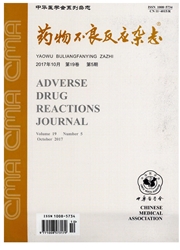

 中文摘要:
中文摘要:
替诺福韦是一种新型核苷酸类逆转录酶抑制剂,用于治疗HIV感染和慢性乙型肝炎。替诺福韦的潜在肾毒性与药物在肾脏排泄有关,病理改变表现为肾小管损害,临床表现为血磷降低和血清肌酸升高,还可导致Fanconi综合征、间质性肾炎和急性肾衰竭。替诺福韦的骨毒性是肾毒性的继发表现,临床表现为肌无力、骨痛和骨折。替诺福韦对肾脏-骨骼损害与基础疾病、基因多态性、血药浓度和药物相互作用有关。服用替诺福韦的患者应定期监测肾功能、电解质,低磷血症患者给予补磷治疗。肌酐清除率﹤50 ml/min的患者应调整替诺福韦的给药剂量。大部分患者在停用替诺福韦后肾功能会明显改善,部分患者可发展为慢性肾病。
 英文摘要:
英文摘要:
Tenofovir is a new class of nucleotide reverse transcriptase inhibitor with effective for treating HIV-infection and chronic hepatitis B. The potential renal toxicity of tenofovir is related to renal excretion. Renal histopathology revealed tubular injury. The main clinical manifestations of renal damage are decreased phosphorus and increased serum creatinine,and Fanconi syndrome,interstitial nephritis and acute renal failure may also develop. The bone toxicity of tenofovir is secondary to renal toxicity. The clinical manifestations include muscle weakness,bone pain and bone fracture. Tenofovir caused kidney-bone damage are associated with underlying diseases, gene polymorphism, plasma drug concentration and drug interactions. Patients taking tenofovir should be regularly monitored for renal function and electrolyte. The hypophosphatemia were treated with phosphate supplementation. The drug dosage should be adjusted when creatinine clearance rate is ﹤50 ml/min. Renal function was improved markedly after tenofovir withdrawal in some patients,but part of patients progressed to chronic kidney disease.
 同期刊论文项目
同期刊论文项目
 同项目期刊论文
同项目期刊论文
 期刊信息
期刊信息
